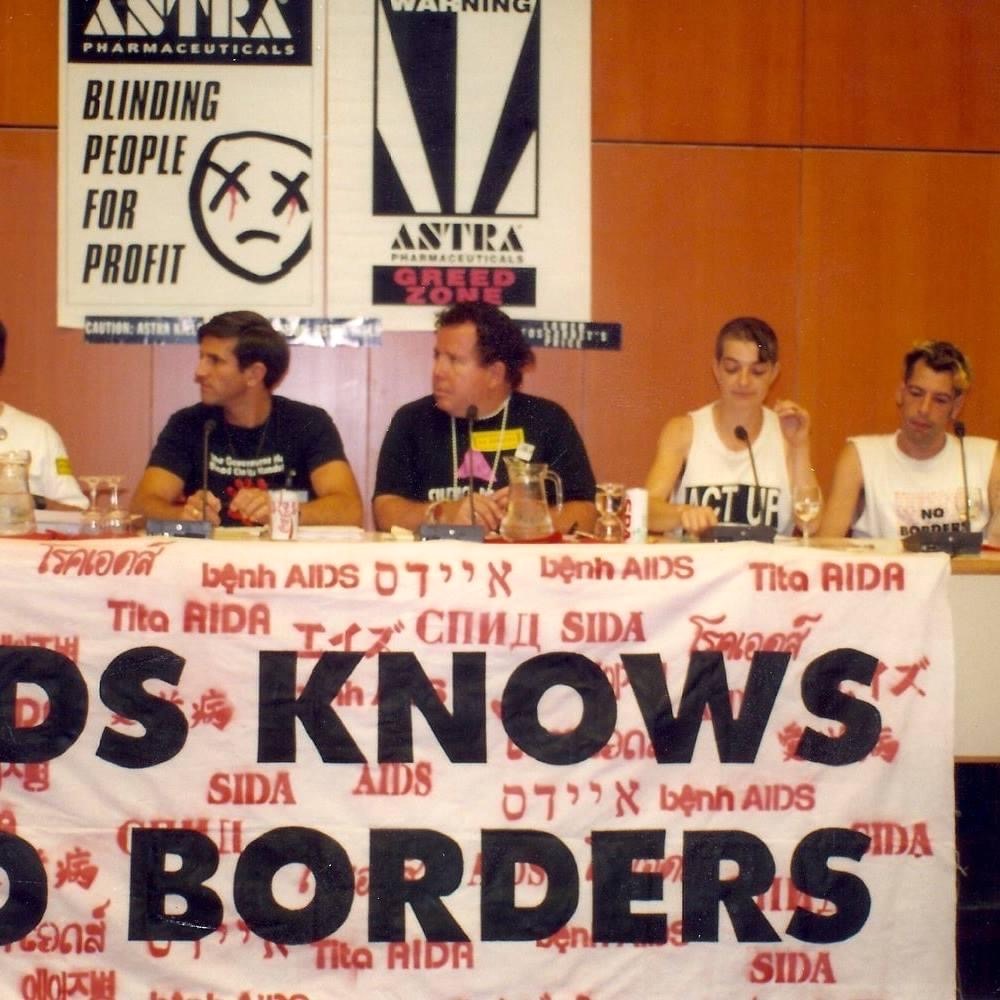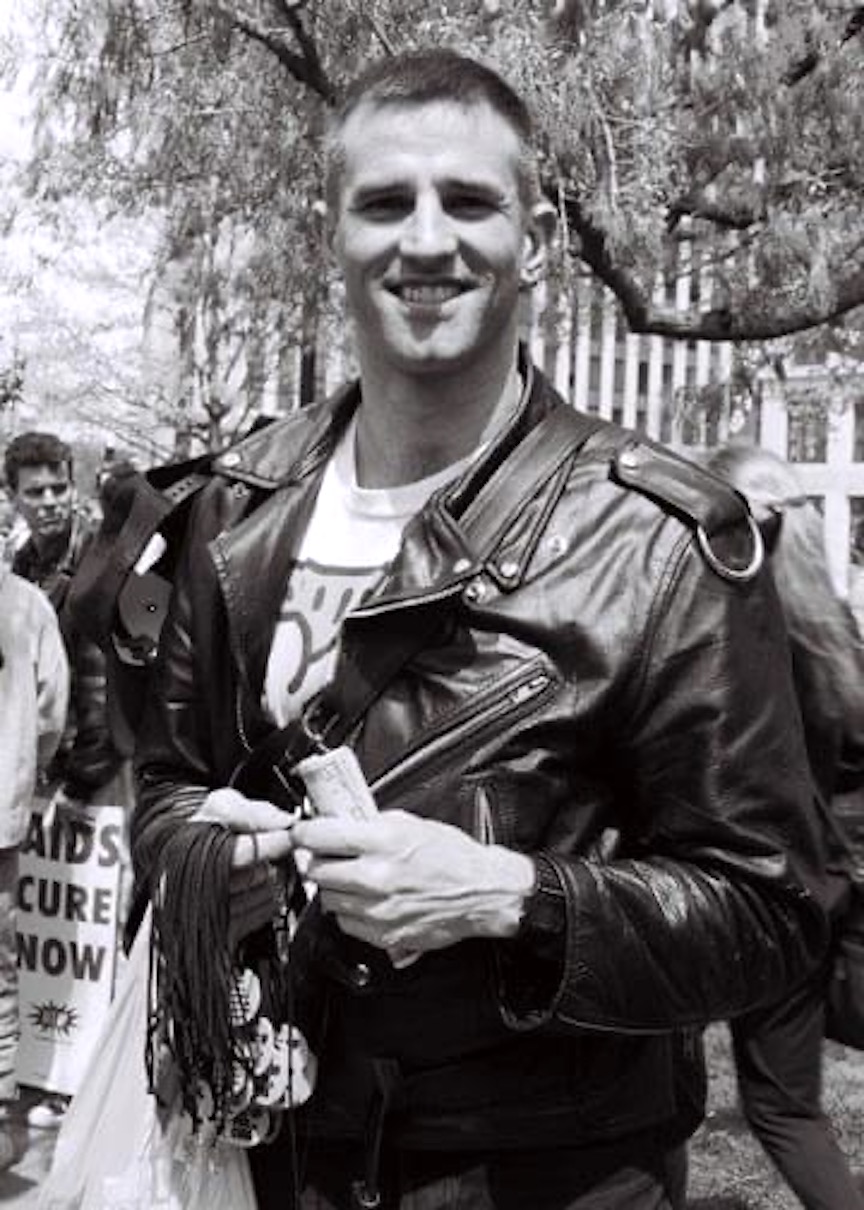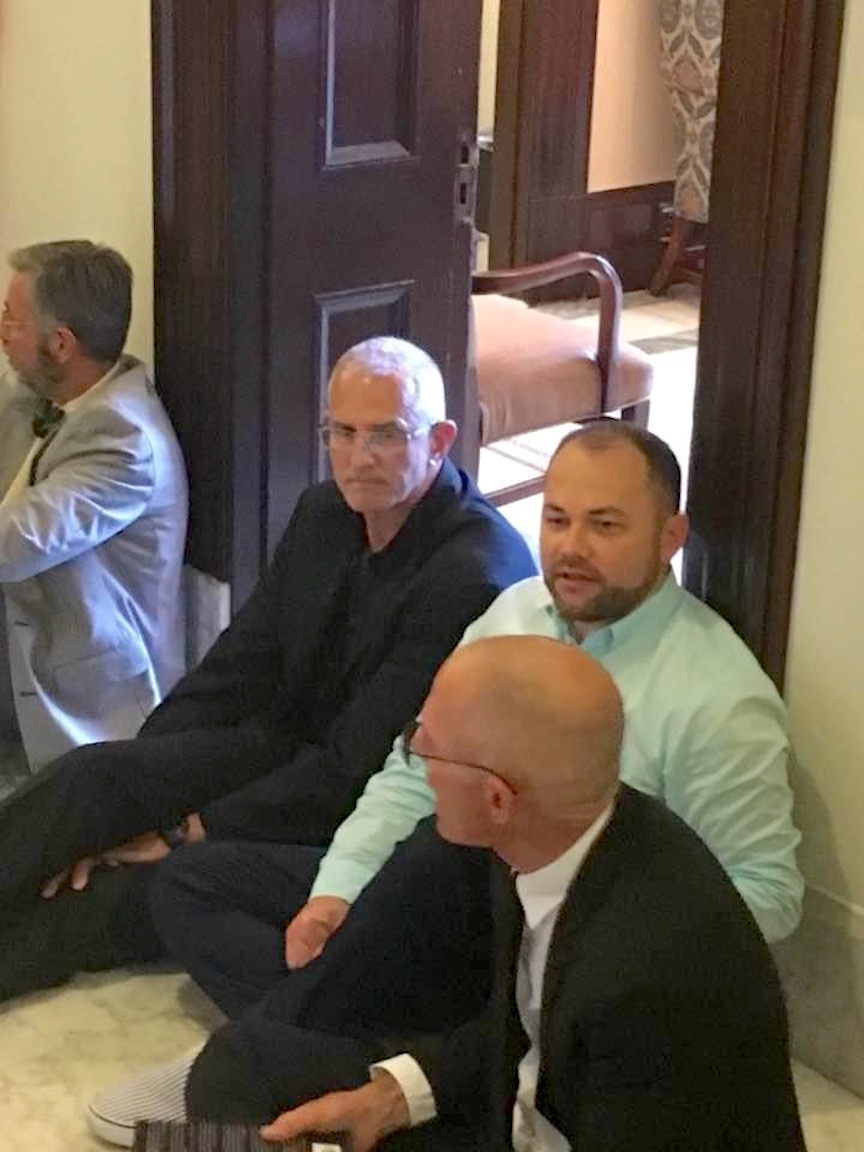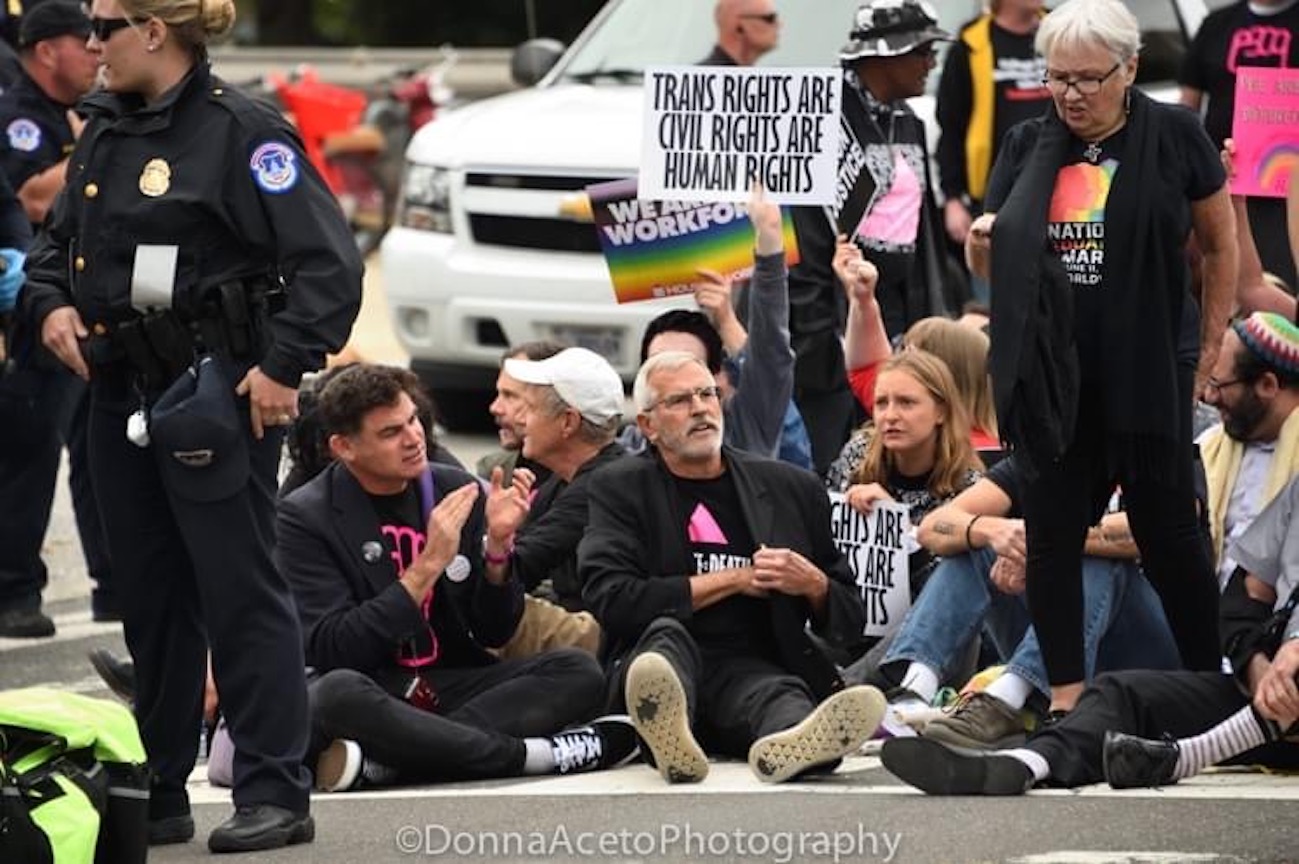Eric Sawyer and fellow activists protesting against George Bush, Sr.’s inadequate response to the AIDS epidemic, Kennebunkport, ME. Their sign reads 114,000 Americans Dead of Aids. Is This Your National Plan, George?” Photo courtesy of Eric Sawyer.
Eric Sawyer and fellow ACT UP activists marching to the White House for the ashes action [where they scattered the ashes of those who died of AIDS on the White House lawn to protest the government’s inadequate response to the AIDS epidemic], Washington, DC. Photo courtesy of Eric Sawyer.
Eric Sawyer and fellow ACT UP activists marching to the White House for the ashes action [where they scattered the ashes of those who died of AIDS on the White House lawn to protest the government’s inadequate response to the AIDS epidemic], Washington, DC. Photo courtesy of Eric Sawyer.
Eric Sawyer holding Lerry Kert’s ashes in a metal urn and a photo of Kert with a blood stain (captioned “Not Appearing: Lerry Kert”) as a sign, Washington, DC. He later scattered Kert’s ashes on the White House lawn. Photo courtesy of Eric Sawyer.
Eric Sawyer and fellow ACT UP activists during the ashes action [where they scattered the ashes of those who died of AIDS on the White House lawn to protest the government’s inadequate response to the AIDS epidemic], Washington, DC. Photo courtesy of Eric Sawyer.
Eric Sawyer and fellow ACT UP activists during the ashes action [where they scattered the ashes of those who died of AIDS on the White House lawn to protest the government’s inadequate response to the AIDS epidemic], Washington, DC. Photo courtesy of Eric Sawyer.
Eric Sawyer and fellow activists participating in the Amsterdam AIDS Conference’s press conference on the HIV immigration ban, Amsterdam, Netherlands. Photo courtesy of Eric Sawyer.
Eric Sawyer at the Second March on Washington, 1988, Washington, DC. Photo courtesy of Eric Sawyer.
Eric Sawyer and fellow activists during a sit-in at Mitch McConnell’s office in the Senate over Obamacare, Washington, DC. Photo courtesy of Eric Sawyer.
Eric Sawyer and fellow activists protest outside the Supreme Court during Brett Kavanaugh’s confirmation hearing, Washington, DC, 2018. Their signs read “Trans Rights Are Human Rights Are Civil Rights”. Photo courtesy of Eric Sawyer.
Eric Sawyer was born in 1954 in Binghamton, New York. Although his parents had little money and even less in the way of social standing, they were determined their kids should do better, rise higher. Eric was quiet and moody kid. He cried easily and was dubbed a sissy. After a late growth spurt, Eric became a star athlete and student body president. But Eric never forgot the rage he felt was a bullied boy. Later in life, he would channel that rage to fight against the defining event of his generation: the AIDS epidemic.
After college, Eric headed west to Boulder, Colorado for grad school, where he promptly came out and threw himself into the world of queer activism. In 1980, he moved to New York City with the aim of making a lot of money by renovating old buildings, and using the revenue to fuel gay political causes. He had no idea that he had already acquired HIV. In those days, no one knew; but that soon changed. A “gay cancer” was ravaging the community. Four years later, Eric’s lover and soul mate Scott got sick. Purple legions appeared on his face, neck and hands, and his hair fell out. Eric and Scott were thrown out of restaurants by screaming waiters. Strangers on the street spat at Scott. Scott died, and Eric was told to get his affairs in order. His response was to get fighting mad. He and writer Larry Kramer became founding members of ACT UP (the AIDS Coalition to Unleash Power). With ACT UP, Eric participated in countless actions like dumping the ashes of people who had died of AIDS on the White House lawn. But Eric also saw far too many people with AIDS dying homeless on the street. He started a housing committee within ACT UP, and then a standalone organization called Housing Works to advocate for housing for homeless people with AIDS.
In the mid-1990s, lifesaving drug “cocktails” for people with HIV became available in the US. When Eric learned that cost and other factors put the treatment out of reach for 97 percent of the world’s HIV-infected population, he founded a new organization called Health GAP (Global Access Project), to bridge the essential medicines gap between developed countries and the developing world. He worked directly with UNAIDS helping to develop a number of policy programs including the three zeros (zero new HIV infections, zero discrimination, and zero AIDS-related deaths). After retiring from UNAIDS in 2016, Eric served as vice-president at Gay Men’s Health Crisis (GMHC), one of the world’s leading provider of services to people with AIDS.
Eric lives with survivor’s guilt. He wonders why people he considers more deserving of life than himself died, and he lived. “You never really get over it,” he says. If there’s one thing that consoles him, it’s how the fervent, outraged activism unleashed by AIDS radically altered the way that public health is done on a global scale. At the core of the shift is the motto “nothing for us without us”. In practice, it means that people facing disease the world over are reclaiming authority over their lives and treatment, rather than being treated as passive bystanders. At the end of a long interview reviewing and reliving more than 30 years of pain, grief and rage, this reality brings Eric to tears.

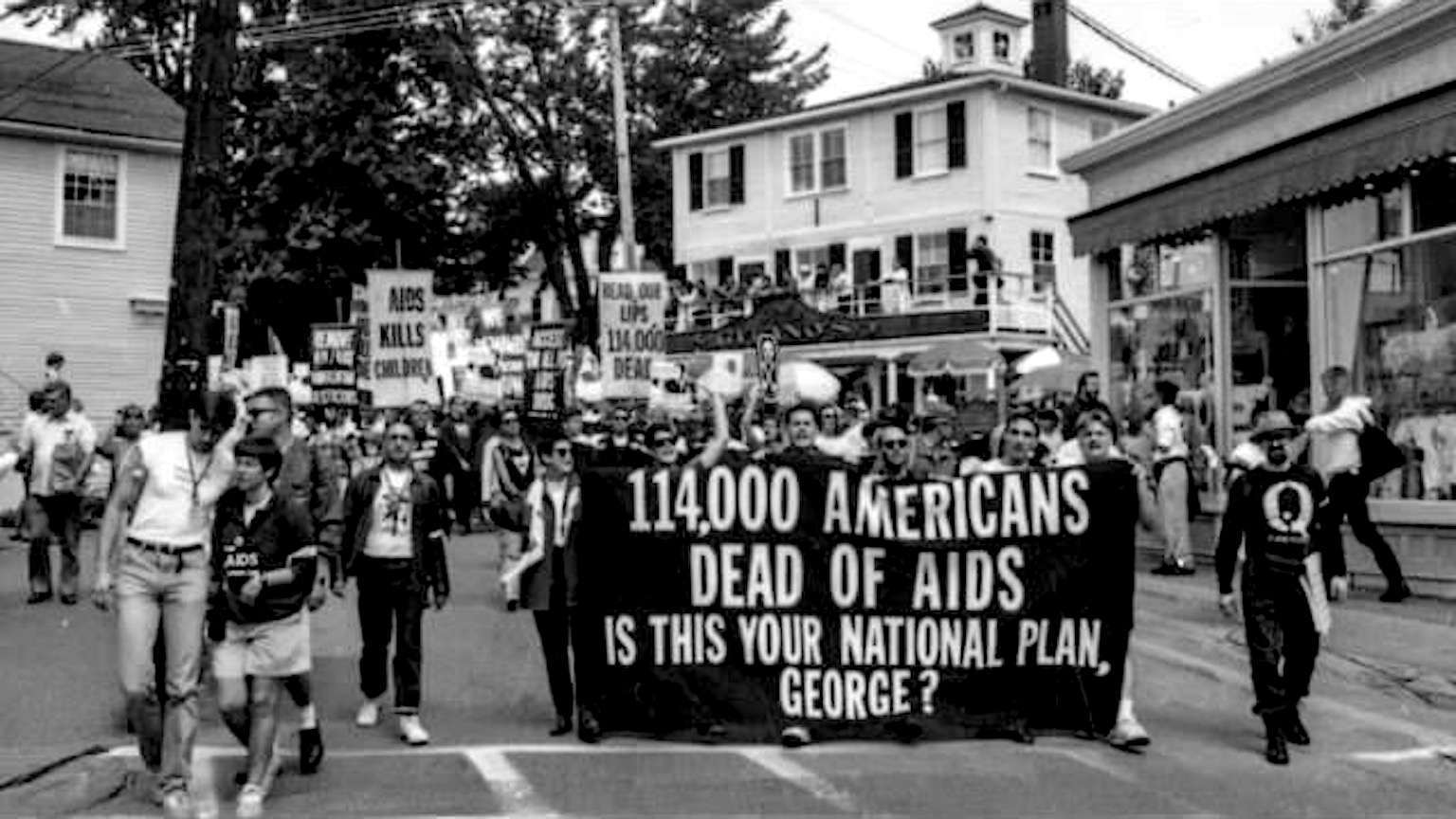
![Eric Sawyer and fellow ACT UP activists marching to the White House for the ashes action [where they scattered the ashes of those who died of AIDS on the White House lawn to protest the government’s inadequate response to the AIDS epidemic], Washington, DC. Photo courtesy of Eric Sawyer.](https://theoutwordsarchive.org/wp-content/uploads/2022/06/Sawyer_Eric_0132_photo8.jpg)
![Eric Sawyer and fellow ACT UP activists marching to the White House for the ashes action [where they scattered the ashes of those who died of AIDS on the White House lawn to protest the government’s inadequate response to the AIDS epidemic], Washington, DC. Photo courtesy of Eric Sawyer.](https://theoutwordsarchive.org/wp-content/uploads/2022/06/Sawyer_Eric_0132_photo7.jpg)

![Eric Sawyer and fellow ACT UP activists during the ashes action [where they scattered the ashes of those who died of AIDS on the White House lawn to protest the government’s inadequate response to the AIDS epidemic], Washington, DC. Photo courtesy of Eric Sawyer.](https://theoutwordsarchive.org/wp-content/uploads/2022/06/Sawyer_Eric_0132_photo5.jpg)
![Eric Sawyer and fellow ACT UP activists during the ashes action [where they scattered the ashes of those who died of AIDS on the White House lawn to protest the government’s inadequate response to the AIDS epidemic], Washington, DC. Photo courtesy of Eric Sawyer.](https://theoutwordsarchive.org/wp-content/uploads/2022/06/Sawyer_Eric_0132_photo6.jpg)
